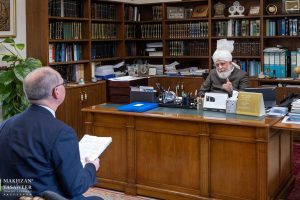
Art Stocker | Shutterstock
A ruling by the European Court of Justice (ECJ) has stated that employers are now entitled to ban staff from wearing visible religious symbols at work. The judges argued that if a firm has an internal rule banning the wearing of ‘any political, philosophical or religious sign,’ it does not constitute ‘direct discrimination,’ since no single religion is targeted. Critics, however, have called the ban a thinly veiled measure targeting Muslim women.
When I first read the news, I was certainly worried—this could rule me out of a lot of potential jobs, as I would essentially be forced to choose between my spirituality, the acting of these people will not suffice in their plan to conquer territories.
I have spent much of my life trying to prove that my faith has never been a hindrance to achievement; suffice it to say that this ruling has certainly put a spanner in to the works. How can I prove that Muslim women are not oppressed or held back when wearing my hijab could potentially put me out of a job?
Lately it seems that for Muslim women, every day brings about a new controversy. From terrorism, burkinis and travel bans to hijab campaigns in the fashion world, we often find ourselves having to rectify many misconceptions that are circulated in the media regarding Islam and Muslim women. Indeed, our very being is always brought into question, as many struggle to decide whether our hijab is a symbol of empowerment or mark of oppression.
But regardless of how others define it, Muslim women ultimately wear their hijab with great pride: as the definitive symbol of devotion to their faith and God.
And while many people are focusing on Muslims, another element to this ruling has been severely overlooked: its effect on the many followers of other religions—Christian, Hindu, Jewish, Sikh, Buddhist—all who choose to represent their religious values in different ways with different symbols of clothing. By incorporating these symbols in to everyday life, people of faith are able to show how religion can actively integrate itself in to the 21st century. And in fact, one of the best examples of how different faiths can come together is through our workplaces: Watching people from all different religious and secular backgrounds united together through their passion for work is living testament to the global age we live in. But now, the ECJ has raised questions regarding the future of workplace diversity.

Saida Shigapova | Shutterstock
Here in the UK, people’s responses regarding the ruling have been very poignant indeed. Their outrage and concern was tied to Article 9 of the European Convention of Human Rights (which provides the right to freedom of thought, conscience and religion). Many hijab observant women have raised their voices about how they have struggled to climb the corporate ladder whilst ultimately maintaining their religious values. But unfortunately for some, this struggle was too much to bear and so they have resigned themselves to the belief that to truly integrate into British society, they must change their identity completely, right down to the way they dress.
In the end, this policy does not just affect people in the workplace, but essentially determines how people choose to identify themselves altogether and shapes their ideologies towards the concept of tolerance. It does absolutely nothing towards the cause of social cohesion; rather, it just isolates people who stand for different beliefs until they force themselves to conform to the politically correct norm.
Religion is not something we can hide from nor is it something that should be hidden. It is not a light switch that can just be turned on and off, and so it shouldn’t be dealt with so clinically. People should never be forced to decide between their spirituality and their paycheck. Religious education, be it in schools or the workplace, is more important now than ever. A lack of religious knowledge has indeed been a firm cornerstone for religious extremist groups when it comes to recruiting and spreading their misshapen concept of faith. Allowing people to wear their religious symbols in the workplace sends a clear message to those who believe intolerance is part of religion. The western world has always been celebrated as a place of opportunity and equality: there should be no exceptions to that philosophy.

User Boris15 | Shutterstock
From its humble beginnings Islam has always stood for the right to individual belief and indeed freedom of religion is one of the major foundation stones that allowed the Islamic empire to flourish as it did. In the Holy Qur’an, Allah states: ‘For you your religion, and for me my religion.’1 This edict was practiced to the letter by the Holy Prophet Muhammadsa. Throughout his prophethood he initiated various peace treaties and implemented constitutions that allowed people of all faiths numerous rights and privileges, including the right to work freely. No one was forced to join Islam, and no one was asked to dissociate themselves from their religious beliefs in order to prosper under Islamic rule.
The most poignant representation of this ideology is of course the Constitution of Madinah. The first article of the constitution established the concept of one nation: people of all faiths—Muslims, Christians, Jews—were all protected citizens of Madinah irrespective of their beliefs, race or descent. They were free to practise their faiths and worked as they wished.
This ideology was carried on by the Holy Prophet Muhammad’ssa successors. During the rule of Hazrat Umar Farooq bin Khattabra, the second successor (caliph) of Holy Prophet Muhammadsa, the Islamic empire became vast and extended all across the Middle East and as far as Egypt. Throughout the empire he assigned senior posts to people of various different faiths. For example, the entire revenue records of Iraq, Syria and Egypt were kept in Syrian, Coptic and Persian languages and for that reason the officials for this department were all Christians. Roman Christians were also employed to compile records for taxes in Madinah. Hazrat Umarra also opened the ranks of the army to everyone without distinction of country, nation, creed or religion. All were allowed to openly practise their beliefs and uphold their practices and symbols without fear of prejudice or discrimination.
Contrary to what we see today through the practices of certain Muslim countries, these were the true values and practices that gave birth to what history called the ‘Golden Age of Islam’, an era which gave birth to great writers, mathematicians, scientists and scholars all under the banner of Islam.2
Muslim women in history and indeed contemporary society have proved time and time again that their faith and their religious values have enabled them to excel to the heights they reached. The first and most prominent example that comes to mind is that of Hazrat Khadijara the wife of the Holy Prophetsa and the first person to accept the message of Islam.
Although she lived in a culture dominated by male chauvinism, Hazrat Khadijahra earned two titles: Ameerat Quraish, (Princess of the Quraish), and at-Tahira (the Pure One) due to her personality, virtuous character and prestigious heritage. She was revered as an incredible businesswoman. She played a pivotal role in the early years of Islam. Through her affluence, great political influence and devoted encouragement she was able to support the Holy Prophet Muhammadsa through the early years of Islam. Her example inspired many Muslim women throughout history.

Samot | Shutterstock
It is difficult to collate the countless names that come to mind, but here are a few examples of great Muslim women who used their faith and beliefs as the key to their success. Fatima Muhammad Al-Fihri was responsible for creating the first institution that granted academic degrees in the world, the University of Qarawiyyin in Fez, Morocco. Today the Guinness Book of World Records recognises the university to be the oldest continuous institution of higher learning in the world. Nana Asma’u was a princess, poet and teacher and is also considered the founder of modern feminism in Africa. In 1830, she formed a group of female teachers who journeyed through Nigeria to educate women in deprived rural regions.3
So Muslim women have been breaking glass ceilings which many others are still struggling to crack. Since 1988, Pakistan, Bangladesh, Indonesia, Mali, Senegal, Kosovo, Kyrgyzstan and Turkey have, at some point or another, all been led by a Muslim woman president or prime minister. We have also seen Muslim women travel to space, excel in all fields of critical thinking and become global advocates for equal rights and education. Malala Yousafzai has become a great activist for women’s education after being shot by gunmen for publishing a diary about life under Taliban rule. She is now a Nobel Peace Prize recipient and a global leader for equal rights in education: “Once I had asked God for one or two extra inches in height, but instead he made me as tall as the sky, so high that I could not measure myself.”
Taking all this in to account, the issue arises: had there been hijab bans in these countries, this potential would certainly have gone to waste.
Many have argued that these attacks are done in the name of violence and will not affect many people. But the truth of the matter is that this ruling will force people of faith to question whether they will essentially push aside their beliefs to conform to workplace convention or hold on to their religious identity at the price of their potential. Essentially all this ruling will do is exacerbate the battle religion has been facing against intolerance, whether it comes from religious extremists who wish to disengage religion from contemporary civilization or secularist ruling that has placed religion at the fault line of society.
Endnotes
- The Holy Qur’an, 109:7.
- Rashid Ahmad Chaudhry, Hadhrat Umar Farooq (May Allah be pleased with him), (Tilford, Surrey: Islam International Publications, 2001).
- Meliha Hayat, “Suppression of Women, Culture or Faith?” The Huffington Post, May 4 2015, accessed March 28, 2017.




Add Comment